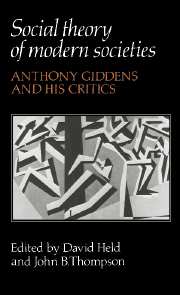Book contents
- Frontmatter
- Contents
- List of contributors
- List of abbreviations
- Editors' introduction
- 1 Social theory as critique
- 2 Hermeneutics and modern social theory
- 3 The theory of structuration
- 4 Models of historical trajectory: an assessment of Giddens's critique of Marxism
- 5 Capitalism, nation-states and surveillance
- 6 War and the nation-state in social theory
- 7 Only half the story: some blinkering effects of ‘malestream’ sociology
- 8 Citizenship and autonomy
- 9 Presences and absences: time–space relations and structuration theory
- 10 Space, urbanism and the created environment
- 11 On the (ir)relevance of structuration theory to empirical research
- 12 A reply to my critics
- Select bibliography
- Index
11 - On the (ir)relevance of structuration theory to empirical research
Published online by Cambridge University Press: 24 November 2009
- Frontmatter
- Contents
- List of contributors
- List of abbreviations
- Editors' introduction
- 1 Social theory as critique
- 2 Hermeneutics and modern social theory
- 3 The theory of structuration
- 4 Models of historical trajectory: an assessment of Giddens's critique of Marxism
- 5 Capitalism, nation-states and surveillance
- 6 War and the nation-state in social theory
- 7 Only half the story: some blinkering effects of ‘malestream’ sociology
- 8 Citizenship and autonomy
- 9 Presences and absences: time–space relations and structuration theory
- 10 Space, urbanism and the created environment
- 11 On the (ir)relevance of structuration theory to empirical research
- 12 A reply to my critics
- Select bibliography
- Index
Summary
Introduction
In recent years one of the most hotly debated issues in social science, particularly in human geography, has been the nature of the relationship between theory and empirical work. In human geography at least two views have prevailed. Thus, for those who see theory as an ordering framework, theory acts as a type of ‘filing system’ for classifying empirical events, whilst for those who see theory as a way of conceptualizing something, theory provides an explanation for empirical events, but is also itself interrogated in terms of its practical adequacy by these events. It is within this second strand of thinking that interest has grown in human geography in the relationship of social theory first to empirical research, and secondly to human geography more generally. Here various arguments have been put forward, but it is primarily the latter to which most attention has been directed. Thus, some individuals have provided straightforward outlines of ideas current in social theory and made suggestions as to what these entail for human geography, whilst others have argued strongly for the importance of space to social theory.
However, thus far in this debate there has been a marked reluctance on the part of human geographers to address one key issue head-on; namely, whether the work of social theorists is critical to the conceptualization of empirical research projects and the explanation of the empirical events with which they are concerned.
- Type
- Chapter
- Information
- Social Theory of Modern SocietiesAnthony Giddens and his Critics, pp. 235 - 248Publisher: Cambridge University PressPrint publication year: 1989
- 48
- Cited by



